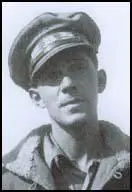Leonard Lamb

Leonard Lamb was born in Cleveland in 1910. After attending Brookland College, part of City College of New York, he became a school teacher. He also worked as a social worker in the Emergency Relief Bureau in New York City.
In 1935 Lamb joined the American Communist Party. On the outbreak of the Spanish Civil War several party members attempted to join the Abraham Lincoln Battalion, a unit that volunteered to fight for the Popular Front government against the military uprising in Spain. However, at this time it was decided to keep top party members in the United States.
After the disaster of Jarama the leaders of the American Communist Party changed its mind about the role of its activists and allowed Lamb, Joe Dallet, Steve Nelson, David Doran and 21 other volunteers to go to Spain.
Lamb eventually was appointed to the post of Chief of HQ Staff. At Brunete he became Adjutant Commander to Milton Wolff. This produced several jokes about a Wolff and Lamb working together. During the fighting at Fuentes de Ebro he was expected to replace Hans Amlie as commander of the Lincoln-Washington Battalion. However, he shot himself in the foot while cleaning a captured pistol and the post went to Philip Detro instead.
Lamb also took part in the fighting at Quinto, Belchite and Teruel. He was sometimes critical of his commanders: "Belchite - the stinkingest town I was ever in... we had to storm that stupid, stupid town against tremendous odds and many of our people killed because it had been announced - by the War Ministry - that Belchite had been captured."
As Cecil D. Eby, the author of Comrades and Commissars: The Lincoln Battalion in the Spanish Civil War (2007), pointed out: "Lamb was wounded several times he always returned quickly to the battalion and served loyally until the Lincolns for home... Lamb never became a permanent commander, though he compiled an outstanding battle record in Spain."
On 25th September 1938, Juan Negrin, head of the Republican government, announced for diplomatic reasons that the International Brigades would be unilaterally withdrawn from Spain. However, General Francisco Franco failed to reciprocate and German and Italian forces remained to continue the struggle.
Lamb later argued that he was never given higher office in Spain because he refused to accept the dominant political ideology of the American Communist Party. "Unless you agreed with the Soviet Union you were a son of a bitch. So I realized that for all the courage of rank-and-file Communists in Spain and in the union movement, the Party as such was absolutely useless." Lamb left the party after the signing of the Soviet-Nazi Pact.
Primary Sources
(1) Alvah Bessie, Men in Battle (1939)
We began to be aware of exactly how bad the situation was. The Brigade went in with about two thousand men, came out with thirteen hundred; the Lincoln Battalion went in with about five hundred, and now we had about a hundred twenty. Most of the men who had come up from Tarrazona with me for their first action were gone, though many old-timers too had not yet appeared. Sam Grant, decorated just before the action, was gone-steel helmet and all. Joe Bianca, the Italian-American seaman from the machine-gun section, was with us, but half his men were gone, including the social-worker who had reprimanded Irving that day. We lost the commanders of Companies 1, 2 and 3, the only companies we had. We lost the commissars of Companies 1, 2 and 3. Wolff had not yet returned, nor Leonard Lamb of the Brigade staff. Undoubtedly many were still behind the Fascist lines, wandering through the hills toward the Ebro; or so we thought, for they never came. Mail came up with Harry Hakam, the mailman; and we sat crouched around a lighted match under a blanket in a deep ditch, while he went through the mail. He read hundreds of names, but only about fifteen men claimed letters. It took him half an hour to read all the names on the letters, and after the first few times nobody would say, "Dead" or "Missing"; we just kept silent.

